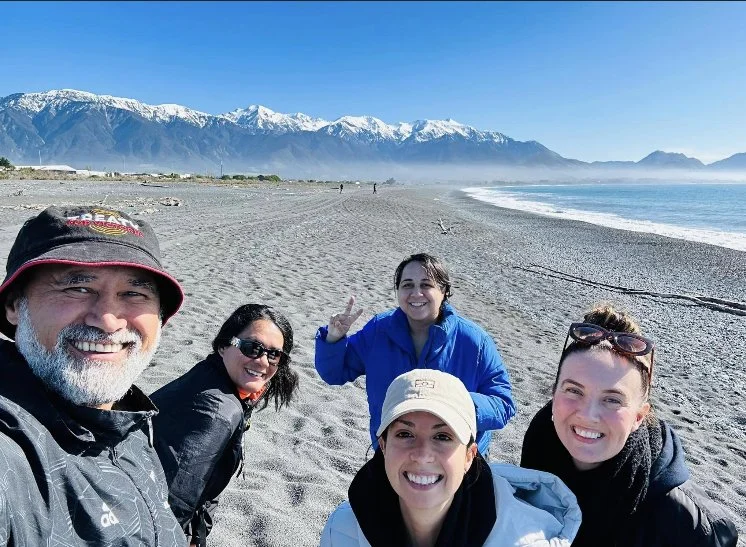Treaty is all about relationship
In early October, the 2023 Cohort travelled to Ōtautahi (Christchurch), Aotearoa for Module Five (M5), an intensive intercultural exchange module delivered in partnership with the University of Auckland.
This trip is part of the Fellows’ foundation year program. During this program, they will complete a Master's degree in Social Change Leadership at the University of Melbourne.
Typically, M5 is delivered on the North Island. This year's module, however, took place on Te Waipounamu (South Island), on the lands of the Māori Iwi (nation group/tribe) Ngāi Tahu.
Fellows, Pou, staff and guests outside Rāpaki Marae.
Photo: Hineani Roberts
Te Hapū o Ngāti Wheke (a local tribal council of Ngāi Tahu) hosted the Fellows at Rāpaki Marae, which is nestled on the shores of Whakaraupō (Lyttelton Harbour), about a 25-minute drive south of Ōtautahi.
2022 Fellow Holly Weir-Tikao said it was an honour to host the first Te Waipounamu-based module alongside her local community.
“I was so thrilled to support the 2023 cohort to travel to Te Waipounamu to learn about Ngāi Tahu Treaty settlement and cultural and economic sovereignty projects happening on the ground within our local communities. Our experiences and identity here in Ngāi Tahu are very unique compared with other tribal communities around the motu (country),” said Holly.
M5 aims to broaden Fellows' knowledge of agreement-making between Indigenous peoples and the state (or Crown). Fellows investigated iwi case studies and on-the-ground experiences of Māori communities, as well as explored contrasts in violations, reparations, and differing experiences of sovereignty between Aotearoa and Australia.
To help navigate this learning experience, Fellows were graciously welcomed onto the Rāpaki Marae, where they heard Ngāi Tahu leaders speak on Treaty, repatriation, and the Ngāi Tahu Treaty settlement process.
Guest speakers included David Tikao, Investment Manager Endowments at Ngāi Tahu Holdings; Melany King, Strategy Advisor at Te Wananga o Waiataha (Canterbury University); Takerei Norton (Ngāi Tahu), Manager of the Ngāi Tahu Archive; and Tā Mark Solomon, former Chair of Te Rūnanga o Ngāi Tahu.
AFSE Pou, Donna Ngaronoa Gardiner and Uncle Mick Adams, accompanied the group, providing cultural support, guidance and safety.
AFSE Pou Uncle Mick Adams with Fellows. Photo: Hineani Roberts
Fellows learned about the complexities of Treaty settlements in Aotearoa, Crown breaches and intergenerational considerations when managing the commercial assets of Ngāi Tahu Iwi.
Speaking passionately about his people, Tā Mark Solomon shared his determination to facilitate both iwi and wider Māori success by unlocking the potential of the Māori economy.
“A true rangatira (leader) is a servant of the people,” said Tā Mark Solomon.
Māori economies are major players within the contemporary fiscal environment – although this is often unacknowledged by government. The deficit narrative of Māori impoverishment is still strong in Aotearoa, but Ngāi Tahu are changing that.
One of the strategies Ngāi Tahu have employed is using the Treaty process to successfully establish economic mana motuhake (self-determination). As Tā Mark Solomon said, Treaty is ultimately all about relationship: “Treaty is about us, not about individuals, and only works when we bring the collective to the table.”
Fellows Jeremy Nikora, Jade Hadfield, Hayley McQuire, Melissa Kennedy and Jo Voice in Ōtautahi.
Photo: Jeremy Nikora
“The past two days sitting and learning from Ngāi Tahu have been incredible,” said 2023 Fellow Dr Alicia Veasey.
"It is a privilege to hear of their intergenerational strength and strategy in engaging and holding the Crown accountable to honour the Treaty of Waitangi. And a stark reminder that whilst government has no memory, we will, and must, always remember.”
2023 Fellow Jeremy Nikora acknowledged those at Rāpaki Marae, who hosted the Fellows for the first few days, as well as the guest speakers.
"The speakers from Kāi Tahu Rūnanga took us through the journey of Treaty Settlement in 1998 – the story of the seven generations it took to finally get the claim accepted was powerful, sad and uplifting,” said Jeremy.
"My head’s pretty full already, but it's been amazing.”



